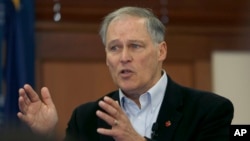Washington Gov. Jay Inslee introduced himself by first name to one college student after another this week as he toured the state that's home to the nation's first presidential primary. Then, still with a smile, he told them that humanity is under existential threat because of climate change.
"We are the first generation to feel the sting of climate change, and we are the last generation that can do something about it," he said. "We have to act now."
So went a two-day East Coast swing this week that previewed how Inslee plans to distinguish himself if he launches a widely expected presidential bid soon. In a Democratic field that could span dozens of candidates — including several boldface names — the relatively unknown Washington governor would likely center his campaign on climate change.
He's hardly the only Democrat talking about the issue, but his exhaustive focus could test whether climate change resonates among voters after it barely entered the conversation during the 2016 campaign.
In New Hampshire, a small state long conditioned to its role in elevating some presidential hopefuls and burying others, Inslee appeared to succeed in his first steps.
"He did a great job," said Olivia Teixeira, a Saint Anselm College sophomore from neighboring Massachusetts who plans to vote in New Hampshire. "He shined a light on an issue that most candidates don't bring to the forefront, and that can help him stand out."
Indeed, Inslee is unbowed by the prospects of being an underdog should he join a field that already includes Sens. Kamala Harris of California and Elizabeth Warren of Massachusetts, among others, with New Jersey Sen. Cory Booker, former Vice President Joe Biden and liberal icon Bernie Sanders of Vermont possibly joining soon.
The governor is convinced his profile as a state executive along with his emphasis on climate change will distinguish him over time.
There's a record of success that does distinguish governors from legislators and why, on occasion, governors have made good presidents," he said in an interview with The Associated Press. More pointedly, he added, "They can't build a birdhouse in Washington, D.C. We are moving in Washington state."
He even turned his signature issue into a cudgel against potential rivals.
"Here's an existential threat to the United States, and they do their rollouts and the words `climate change' don't appear," he continued, calling it "shocking" and "disappointing," though he did not target anyone by name.
Sanders, along with Sens. Kirsten Gillibrand of New York and Cory Booker of New York, have signed onto the so-called "Green New Deal," a set of aggressive policy proposals, among other things, to curb the warming effects of carbon in the atmosphere. Warren and Harris have both backed the need for action.
Sen. Kamala Harris of California did not mention climate change in a 10-minute announcement interview this week on ABC's "Good Morning America," but she later brought it up speaking with reporters.
Inslee would have some competition on climate issues if billionaire businessman and former New York City Mayor Michael Bloomberg joins the race. But Inslee got a potential boon when another activist billionaire, Tom Steyer of California, passed on a White House bid.
"Don't be surprised if I'm talking to Tom Steyer in the next few weeks," Inslee said, adding that he's emailed with Steyer since he announced he wasn't running but hasn't explicitly asked for his support.
With stops at two colleges, Inslee's New Hampshire itinerary put him in front of young voters he believes are most likely to embrace his pitch. Polling suggests concerns about climate change correlate with age, with younger voters consistently ranking the issue as a higher priority than older subsets of the electorate.
Mostly absent from Inslee's New Hampshire swing were mentions of President Donald Trump. Inslee referred to "the climate denier in the White House" but steered clear of the labyrinth of investigations swirling around the administration, and none of his audience questioned him on the subject.
Winter weather deprived the governor of another opportunity to meet donors and older voters who might be inclined to his candidacy when a flight cancellation caused him to miss the League of Conservation Voters' private fundraising gala that he was set to headline.
The governor did make a private meeting with New Hampshire Democratic Chairman Raymond Buckley, who'd recently taken a public swipe at Inslee — a rare move from a party chairman in an early nominating state. Buckley was aggravated at Inslee, who served as Democratic Governors Association chairman last year, for not devoting more money to the New Hampshire governor's race. Democrat Molly Kelly lost in November.
Inslee called the meeting productive and defended his decision not to invest in New Hampshire, noting that Democrats flipped seven governor's offices elsewhere, the biggest party gains since 1982.
Buckley said he simply wanted "an explanation" that he hadn't gotten during the campaign. He said he'd treat Inslee like any other candidate, and he was clear that longshots and little-known candidates have a shot in his state.
"People are looking for change ... and that means different things to different people," he said. "There is more than one choice for every kind of Democrat. ... We don't know who's going to emerge."
As for when Inslee might officially enter the race, the governor said, "Weeks, not months."




